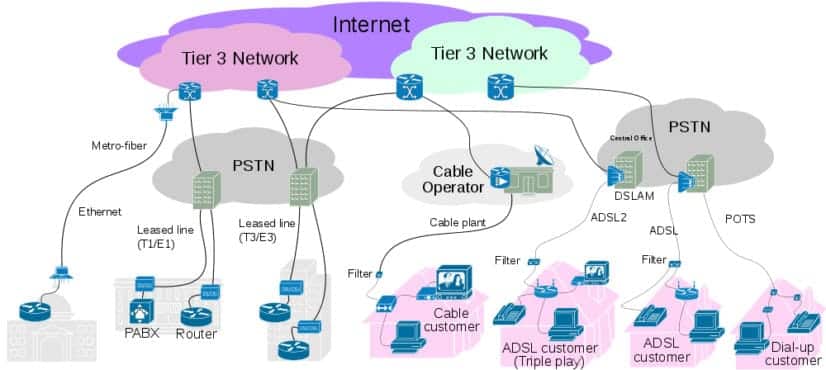Every business has different needs when it comes to internet service. It’s smart to consider your options and evaluate the offerings so that you can make a sound decision. Choosing the right internet solution can be a daunting task when faced with the various service types and features. With that in mind, consulting an expert can be key in developing and implementing a successful plan for your business. After all, making the wrong choices can add up to a multitude of problems and headaches.
Learn the Lingo
The first step to making the right choice is knowing a few basic terms. Having a grasp on just a few simple definitions can help you to stay on the right path when determining your specific needs. Here are three terms you should be familiar with:
Internet Service Provider (ISP): This is the company that provides your access to the Internet.
Bandwidth: The total maximum amount of data that can be transferred between two points on a network in a given period of time. Essentially, this is how fast data can be sent over a connection.
IP Address: This is the unique identifier for a computer or other device.
Now that you know these basic terms, let’s take a closer look at the four main service types: DSL, Cable, Fiber-optic, and Dedicated leased lines. These four types are the most common and the most reliable. They vary in their speed capabilities and in cost.
- DSL (Digital Subscriber Line) uses traditional telephone lines. This is the most common internet connection type. The speed will vary depending on how far you are away from the central office.
- Cable Internet is delivered via coaxial cables to a cable modem in your business. Speeds are shared across multiple users. The system is designed to distribute access evenly.
- Fiber-optic service is incredibly fast and offers better performance. Download speeds range from 15 to 1000 Mbps and upload speeds from 5 to 100 Mbps.
- Dedicated leased lines are dedicated (meaning not shared). These are fiber-optic or copper lines you lease from an ISP. While this type of access is typically the most expensive, it’s also the most reliable option. It is not shared with anyone else, and service levels are guaranteed as part of your contract.
Factors to Consider
It may seem like ISP’s offer the same basic services, but when you take a closer look you’ll start to see how they differ in reliability, price, and options. Knowing what to consider and which questions to ask will help you make the final choice. As a leader of IT Services, here are just a few of the factors that Taylored Systems recommends you consider:
Reliability: Most business-class service comes with assurances regarding uptime, latency, and other metrics. ISP’s typically guarantee that 99.9% of the time your connection will be “up”. If there is an outage and the ISP is responsible, an ISP will often issue a partial refund.
Installation Costs: Business plans usually have both installation and setup fees, as well as equipment fees. Typically ISPs will offer deals waiving those fees if you sign up for a term agreement. Just be sure to look out for termination penalties if you need to break the agreement, or if you need to upgrade/downgrade to a different package.
Equipment Selection: Each ISP is different, but most all of them offer packages that allow you to choose between purchasing equipment and renting equipment. You’ll also need to know if your network requirements will be satisfied by using a basic modem or if you’ll require more robust router with firewall protection and built-in Wi-Fi. ISPs usually install basic modems or gateways. If you need a smarter box on the end of your connection, working with a reputable IT Service provider like Taylored Systems will be a necessity to complete a professional installation.
Dynamic vs. Static IP Addresses: ISP’s offer both dynamic (changing) and static (permanent) Internet Protocol (IP) addresses. Computers use IP addresses as a unique identifier for communicating with each other. If your organization needs to host services such as web, mail, or VPN (virtual personal network), you most definitely need static IP addressing. If not, your business most likely will use dynamic IP addressing.
Making the Decision
After gathering information and carefully evaluating the options for Indianapolis internet providers, you’ll find that there are a number of things to consider before you make a final decision. Taylored Systems takes the time to understand your goals and IT Infrastructure so that we can help our clients choose the best solution that fits their business needs. Our expertise and experience in dealing with carriers of all types, along with our ability to provide network assessments, makes us a leader in technology. As you grow and change, we will provide the best ongoing support to continue satisfying your needs allowing you to focus on growing your business.
Contact Taylored Systems today to determine if we’re the right fit for your internet service and support.

